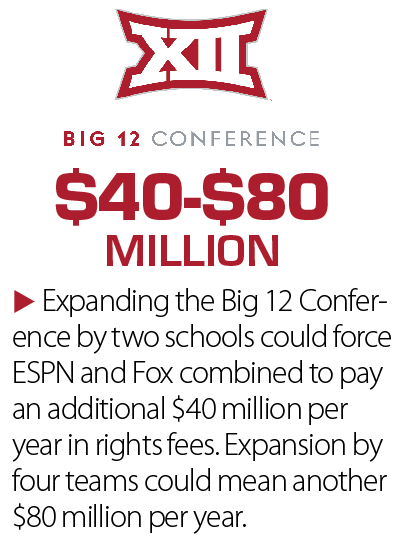 |
Texas’ and Oklahoma’s TV arrangements convinced the Big 12 from pursuing a linear channel.
Photo by: GETTY IMAGES
|
The Big 12’s TV partners are pushing back on the conference’s plans to expand.
ESPN and Fox Sports believe that expansion with schools from outside the power five conferences will water down the Big 12 and make it less valuable, not more, sources said. But the Big 12 is financially motivated to add more teams. A clause in the conference’s media deals stipulate that if the Big 12 expands, it would receive pro rata increases in its rights fees.
The original deals pay $2.6 billion over 13 years, or about $20 million per school annually. Expansion by two schools, theoretically, would force ESPN and Fox combined to pay an additional $40 million per year in rights fees. Expansion by four teams could mean another $80 million per year.
Both networks, according to sources, are digging their heels in against paying those kinds of increases based on expansion with schools outside the power five.
Among the schools reportedly being considered for expansion are Brigham Young, Cincinnati, Connecticut, Houston, Memphis and others. The Big 12, which has 10 teams, has not said if it will expand by two or four schools, but both options are in play.
The drive to expand is fueled by the opportunity to almost immediately generate more money for its schools. The conference’s TV deals run through 2024-25 and the Big 12 already trails the rest of the power five conferences in revenue, so expansion stands out as the only way for the Big 12 to increase revenue.
Any newcomers to the league wouldn’t be expected to receive a full share of TV revenue for multiple years, meaning more money for the 10 existing members.
Also, the Big 12 is the only conference in the power five that doesn’t have a revenue-generating linear channel, or plans to start one. The Big Ten, Pac-12 and SEC have launched networks, while the ACC and ESPN say they will partner on a network in 2019.
The Big 12 earlier this year explored a linear channel and decided against it, in part, because many of its schools like Texas and Oklahoma already have long-term TV arrangements outside of the conference’s primary deals — Texas with ESPN and Oklahoma with Fox.
The conference already has announced plans to start a football championship game next year, which could mean another $25 million to $30 million in revenue. Absent a conference channel, the only other way for the Big 12 to significantly grow revenue in the near term is to add schools and activate that pro rata clause in its media contracts.
That kind of cash grab, sources say, is rubbing ESPN and Fox the wrong way because any new schools would not carry the profile of most power five schools, which is what the networks are paying for.
Network executives spoke on the condition of anonymity because they are in the midst of negotiating with the conference.
Big 12 Commissioner Bob Bowlsby, reached via text message last week, declined to comment on any aspect of the process, but this latest round of expansion clearly was triggered by the ACC’s plans to start a channel and the potential for more revenue.
News broke on July 18 that the ACC would launch a new channel in 2019, and the following day the Big 12 came out with its plan for Bowlsby to start vetting expansion candidates.
Network officials, however, are not happy with any plan that depends on steep rights-fee increases, even if such increases are spelled out in the media contracts.
There’s also some history here. Executives at ESPN and Fox remember 2010 when they helped hold the conference together against the Pac-12’s raid by keeping rights fees at the 12-team level, even though the Big 12 was reduced to 10 teams — Nebraska left for the Big Ten, while Colorado departed for the Pac-12. That was under the previous Big 12 administration led by former Commissioner Dan Beebe.
In this latest round of expansion, network executives say the Big 12 is putting the conference’s financial gain ahead of its quality. ESPN and Fox concede that the conference’s expansion plans would increase game inventory, but the quality of teams coming from outside of the power five would not enhance the Big 12 to warrant the aggressive rights-fee increases.
Several options are being considered at the networks’ headquarters.
ESPN and Fox could negotiate smaller rights-fee increases as opposed to the pro rata increases.
If the networks, both of which have encountered some financial challenges in the last year with cutbacks and subscriber losses, decided to staunchly challenge the contracts, they could simply not pay the increases and force the conference to take them to court. ESPN and Fox would argue that the move to expand and charge the TV networks more money does not reflect the spirit of the original deals, which were signed four years ago. The conference, of course, can fall back on its contracts, which spell out pro rata increases.
Another option would be to go along with the increases now and not support the Big 12 in 2025, when the grant of rights and the TV deals expire.
Either way, this is not what Bowlsby had in mind in 2012 when he signed these TV contracts and proclaimed: “The stability of the Big 12 Conference is cemented.”





